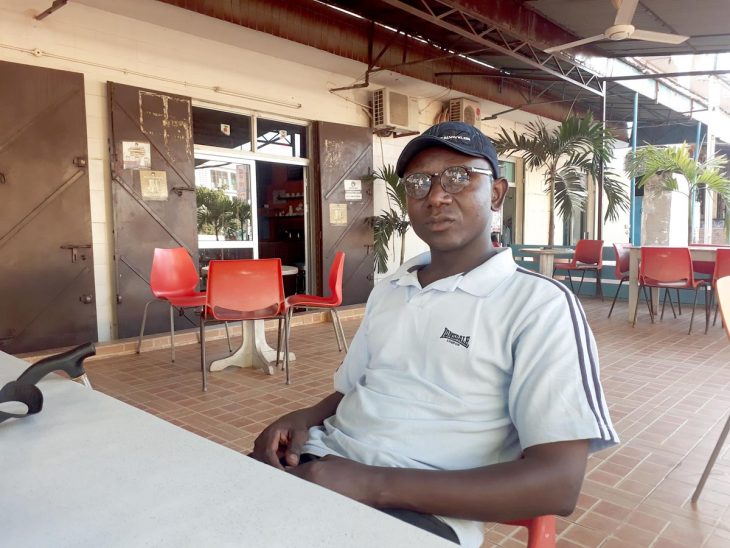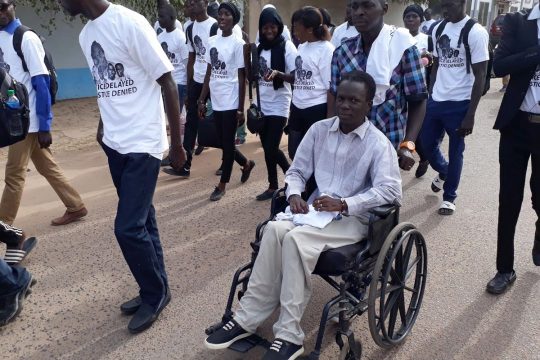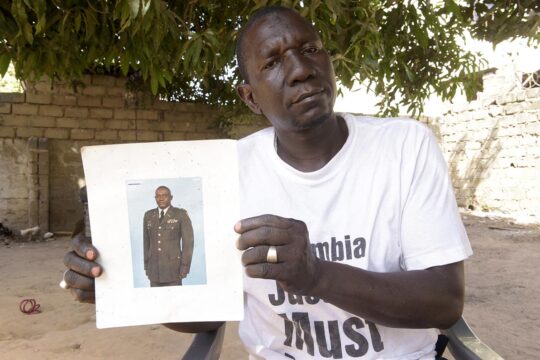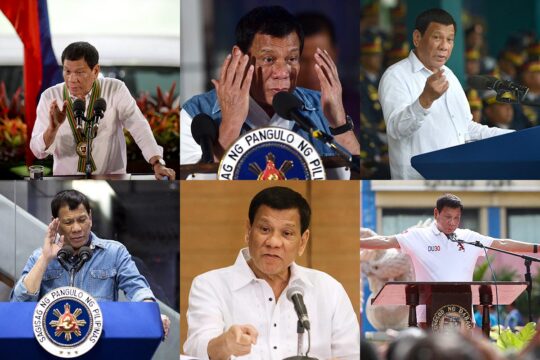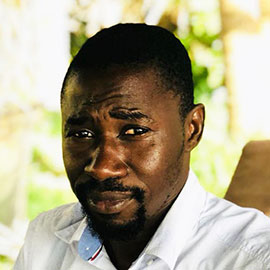Sira Barry lied on her bedside in a modest two-bedroom house in Brikama, about an hour drive from Banjul, Gambia’s capital city. At her parlor to the left was a bed and a chair to welcome guests. She was lying on a mat. She was sick and could not talk to journalists. Sira, fondly called Suba, is the only surviving direct member of the family of Ebrima Barry, a student allegedly beaten to death by members of the Gambia Fire and Rescue Services in 2000. Barry’s death prompted a demonstration that cost their lives to at least 14 students.
“In our family, we have not seen any investigation report, we have not heard of any arrest in connection to our brother’s death. And we have not had any compensation from the state,” said Alagie Barry, a brother of Ebrima of a different mother, declining to make any further comment. He said their family delegated to Alagie’s brother Mbemba Barry, a police officer, to speak on their behalf. Alagie and Ebrima shared the same father Alieu Barry, who had four wives. Alieu died in 2006, without seeing justice for his son. Ebrima’s mother, Boto Sanneh, died in 2002. Ebrima’s four other siblings from Alieu and Boto followed him to the grave without any promise of justice being fulfilled. “They all died after the death of Ebrima,” said Alagie.
The rape of Binta Manneh
The student demonstration was a dark period in Gambia’s recent history. Like all of the country’s past under the former dictator Yahya Jammeh, in power from 1994 to 2017, it is now being revisited by the Truth, Reconciliation and Reparations Commission (TRRC). Seven victims of the events have already testified. More are expected to appear when the public hearings resume on September 16, including alleged perpetrators.
The April 2000 student protest was precipitated by two major events: the death of Ebrima Barry and the rape of Binta Manneh. In 2000, Binta was 15. An athlete, she had travelled from her native Brikama Ba village to represent her school as a sprinter in the national inter-school competition. Binta and her team had gone to the Independence Stadium in Bakau, near Banjul, where the competition was being held. At around 8 p.m. she left the stadium and went out to buy biscuits.
“I found two security officials outside. One of them held my hand and when I tried to move my hand from him, he told me: ‘Don’t you know I am security officer?’. They took me to a dark corner. He raised my skirt up and cut off my underwear. He placed his elbow on my chest and forcefully slept with me,” said Binta before the TRRC on August 20. “I was at the hospital for a week. I was also bleeding for 4 days. I suffered anxiety later because of trauma. I went back to school but the students talked about it [the rape] everywhere I go. I decided to leave school,” testified Binta. She was married off by her parents at that teenage age. But that never took away how the society looked at her. “I was ashamed of myself,” she said. “You should not be,” replied the chairman of the TRRC, Lamin Sise. “The man who forced himself on you should be the one to be ashamed of himself.”
Binta said she was later told that the person who raped her was a member of the paramilitary section of the police. It was the same police who took over the investigation into the attack. “I was going to meet the investigators in Banjul with my aunt but they later told me that I was lying,” she recalled.
Like Ebrima Barry’s family, Binta got no justice for her rape.
Security forces shooting at unarmed students
Under the direction of the national student union called Gamsu, students started to demand justice for Ebrima and Binta, both victims of security forces. The repression of that demonstration would kill 14 of them, injuring dozens of others.
When the student demonstration began, country’s ruler Yahya Jammeh was in Cuba. His vice-president who was in the country at the time, Dr Isatou Njie Saidy, claimed the protesters were carrying guns, justifying the use of force. A statement from the authorities claimed the protest was empowered by “bad elements” in the society who were not students. "There is no doubt that the crisis was incited by the Gambia Students Union (Gamsu) and aggravated by some bad elements and bandits who took advantage of the situation, disguising themselves as students and encouraging the crowd of so-called demonstrators to the damage," the government said in a statement at the time.
However, these claims were discredited in a report of an inquiry published in August 2000. The 9-member commission of inquiry heard the testimonies of 59 witnesses from security forces, students, parents, ordinary people and school administrators, among others. It recommended the prosecution of security forces who had opened fire at the students. “Top police authorities on the ground at the Kanifing on the 10th April 2000 should accept responsibility for the tragedy that happened; namely secretary of state for the interior Ousman Badji, deputy inspector general of police Sankung Badgie, Commissioner of operations Baboucar Sowe and assistant superintendent of police Momodou Ceesay,” said the report. Security personnel “should assume responsibility for the deaths and injuries that occurred as a result of gunshots and face prosecution for their acts,” the report added, also naming among those responsible Gorgi Mboob, the current head of the anti-crime division in the Gambian police. Mboob and his colleagues “carried an AK47 rifle and fired the guns at the direction of the students on the St. Augustine’s Senior Secondary School compound” and “should face appropriate charges”, the report said. The Commission also asked for the prosecution of seven student leaders who had called for the protest, including the president of Gamsu Omar Joof and its vice-president Alhagi S. Darboe.
However, nothing came out of it. No one was prosecuted for the death or torture of students. In April 2001, the National Assembly even passed a law indemnifying people involved in quelling the protest.
“We felt abandoned by this government”
Abdou Karim Jammeh was one of the students who were badly hurt during the protest. He was shot on his knee cap. Now he uses a walking stick. “People who shot us are still in the system and are being paid. It angers us that after changing the government, there is still no justice. Perpetrators are free and enjoying and victims are crying. It is very unfair,” he told JusticeInfo.
In 2017, Jammeh and his colleagues petitioned Justice Minister Abubacarr Tambadou demanding the implementation of the recommendations of the 2000 commission of inquiry. Jammeh said they have since not gotten any response from the authorities.
Justice was not the only thing that evaded the victims. After the shooting, Sainey Senghore, Assan Suwareh and Yusupha Mbaye were evacuated to Egypt for further treatment. Mbaye was shot at his spinal cord, confining him to a wheelchair. Senghore, who later developed gangrene on his foot, told the TRRC that only a month of their medical bill was paid by the government. Their Egyptian doctor had to volunteer to pay the other month. They would later be returned to the Gambia but their medical problems continued. At the airport, their medical reports were taken from them. The explanation given was that the case of the students was a political one.
The victims have been seeking further medical treatment to this day. In 2017, the Turkey embassy in Gambia volunteered free visas and free treatment for them. They were only required to buy their own air tickets. The government claimed it had no money. The Gambia Ports Authority pledged tickets for three of the victims. But until today, the victims could not secure the extra two tickets. “We felt abandoned by this government,” said Abdou Karim.
In 2019 the TRRC established a medical board to review the health status of the victims. The Board again recommended an abroad treatment for four students but so far nothing happened. Ebou Faye Njie, from the TRRC victim support unit, told JusticeInfo they are working on a remedy to the victims’ health problems. It is not clear what solution they have and when it would be implemented.
“For 19 years, we have been crying for justice,” said Senghore before the TRRC. Their cry continues. And Senghore’s dream of studying medicine, like those of his schoolmates, remains a pipe dream.


